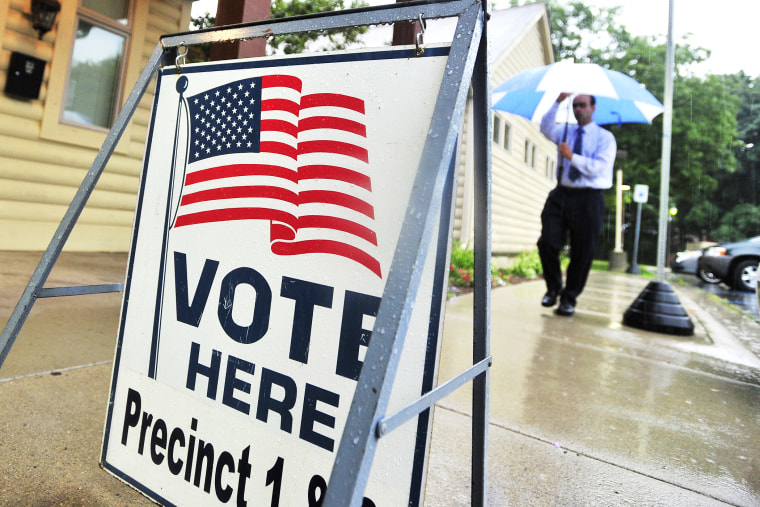Voters in Michigan, Kansas, Missouri and Washington head to the polls on Tuesday – kicking off a month full of important primaries, many of which pit tea party candidates against establishment Republicans.
Tennessee will hold its primary on Thursday, and Hawaii's is on Saturday. Here are five things to look out for in Tuesday's races.
Surveys have shown Kansas Republican Sen. Pat Roberts – who is seeking a fourth term – in the lead, but public polling has been scarce. Roberts, 78, is facing tea party-backed challenger Milton Wolf, a radiologist (and President Obama’s cousin once-removed). Both candidates have had rocky moments on the campaign trail. Roberts’ residency came under scrutiny back in February following a New York Times report saying he owns a home in Virginia but not Kansas. Meanwhile, Wolf faced criticism after it was revealed he posted on Facebook making fun of a patient’s X-rays of gruesome fatal injuries.
2. Does Rep. Justin Amash have staying power in Michigan?
Michigan Republican Rep. Justin Amash, elected in the tea party wave of 2010, is up against investment adviser Brian Ellis, who is backed by the business wing of the Republican Party. Ellis has argued that Amash has alienated too many Republicans and hasn’t voted in line with the residents he represents on issues including abortion and National Security Agency surveillance. Polls have shown Amash with a significant lead, but voter turnout is expected to be low. The 3rd Congressional District, which Amash represents, typically votes Republican, so the winner of the primary is expected to win the general election in November.
3. Is ‘accidental’ GOP Rep. Kerry Bentivolio toast?
In one of the strangest House races of 2012, Michigan Republican Rep. Kerry Bentivolio won his seat after former Rep. Thaddeus McCotter failed to qualify for the GOP primary after it was revealed he had forged signatures on his ballot petition. McCotter’s subsequent resignation left Bentivolio as the only Republican on the ballot. This year, Bentivolio is up against attorney David Trott, who has poured nearly $2.5 million of his own money into the race and is backed by the U.S. Chamber of Commerce and failed presidential candidate Mitt Romney. Polls show Trott with the lead.
4. Who emerges from Washington’s crowded field to replace Rep. Doc Hastings?
Washington Republican Rep. Doc Hastings is retiring after serving 10 terms in the House of Representatives. In Washington, all candidates, regardless of party, compete in the same primary and the top two go on to the general election. Twelve candidates are competing in the state, including eight Republicans, two independents and two Democrats. Four Republicans have emerged as front-runners, including former NFL player and tea party-backed candidate Clint Didier; state Sen. Janea Holmquist; attorney George Cicotte; and director of the state’s Department of Agriculture, Dan Newhouse. But because there are so many Republicans running, it is possible the vote could be split, making room for one or even two of the Democrats or independents to advance.
5. Will the transportation tax and gun rights pass in Missouri?
There are no statewide races that are considered competitive, but Missouri voters will decide on a controversial sales tax to fund more than 800 transportation and highway projects. It’s estimated to bring in at least $540 million annually for a decade. Voters will also weigh in on an amendment that would expand the state’s right to bear arms by expanding the law to cover ammunition and accessories. It would also reinforce language in the state’s constitution to declare those rights “unalienable.” The amendment would also get rid of a current provision that allows restrictions on concealed guns.
